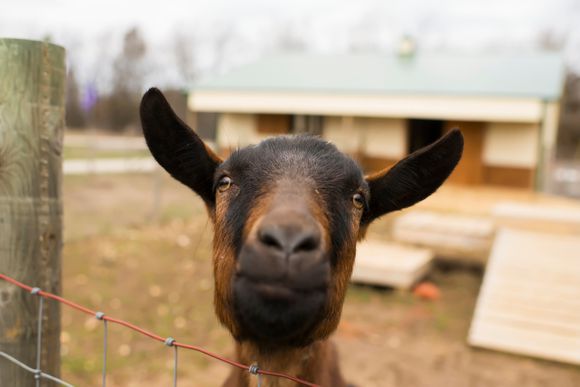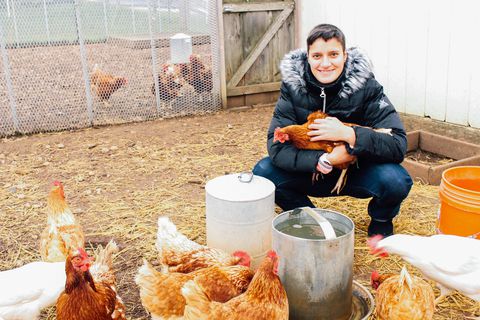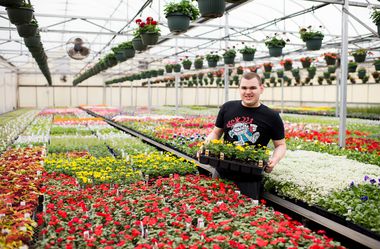Homegrown Farms
Genesee Lake School features Homegrown Farms, a fully functional production farm. The health and wellness of our students is an important focus for our organization. Being a Farm to Table school adds a considerable benefit to our holistic approach to student wellness.

Farm Operation and Opportunities
Controlled Environmental Agriculture: Aquaponics is a system of aquaculture in which the waste produced by farmed fish or other aquatic animals supplies nutrients for plants grown hydroponically, which in turn purify the water. Hydroponics is the process of growing plants in sand, gravel, or liquid, with added nutrients but without soil. the two systems are responsible for sending nearly 4,000 lbs. of fresh produce to our kitchen annually.
- Aquaponics: The aquaponics system has four, 300-gallon tanks that hold 100 Blue Nile Tilapia fish. The farm has shifted recently to breeding our own fish onsite instead of purchasing them externally. When the fish are between 9-11 months, roughly 1.5 lbs., they are harvested and processed onsite. The fish are then served during one of the student meals. In addition to offering very fresh, farm to table fish, aquaponics harvests 30-40 lbs. of lettuce a week in addition to other seasonal vegetables grown in the system.
- Hydroponics: The hydroponics system is responsible for growing lettuce, herbs, tomatoes, cucumbers, peppers, and ginger.
The production of these systems has been so successful, GLS no longer purchases lettuces externally. All lettuce used is grown on site.
Produce Field: The vegetables and fruits grown in the 2.5 acre produce field are farmed using organic practices. Field production yields about 20,000 lbs. of produce annually. The produce is divided with nearly half going to GLS Nutrition Services for student meals, with the rest going to GLS group homes, and offered to the employees of GLS at a reduced cost. The students are offered opportunities throughout the course of growing seasons to become involved in the hands-on learning of where their food comes from. Some of these opportunities involve, but are not limited to: harvesting, planting, and planting beneficial insect planting boarders.
Organic Acreage: Beyond on the produce field lies 38 acres of certified organic farmland. Homegrown Farms cooperative relationship with a local organic farming business. Over the years, the organic acreage and yielded a variety of crops benefiting the students, employees, and the farm. Some of the crops include corn, buckwheat, alfalfa, dried beans, and sunflowers. The yield from these crops has been used to provide fresh hay for our goats, straw for bedding in the goat barn and chicken coops, buckwheat pancake mix, sunflower cooking oil, sunflower bird seed mix, and dried bean mixes. The students enjoy selling these products to their families during the annual Holiday Farm Store.
The Gardens of Homegrown Farms:
- Student Garden: To promote learning and creativity, students are offered their own garden plots every summer. This has elevated the understanding and knowledge of the vegetables they eat what the product looks like after harvest but also what the plant looks like while growing and flowering and how to see the difference. The students love the ability to grab fresh veggies right off the vine and eat while they learn.
- Bouquet Garden: The students work with the Farm to School Educator to pick out and plan what type of flowers they want to grow in the bouquet garden each year. They start the flowers from seed and when they become big enough, they transfer the plants to the garden. Throughout the rest of the summer, the students will cut the flowers to make beautiful, colorful bouquets.
- Native Perennial Garden: A perennial garden is maintained by the students and offers a lovely place to sit in the summer. Some of the flowers can be cut and added to the bouquets the students make. However, largely, the biggest benefit is how native perennials help in preserving the biodiversity of the farm.
- Lavender Lane: The farm maintains perennial Munstead Lavender plants. They are great honeybee attracter for our hives. The lavender is harvested often over the course of the summer to create lavender sachets, lavender soaps, lavender lemonade, and much more.
Extended Season: Students continue to learn about different controlled environmental growing methods and harvest fresh produce in the cold winter months. Extended season growing has been modified to be completely accessible to all GLS students. The produce grown during extended season is generally harvested between October-December and provides Nutrition Services with fresh produce long after the produce field has closed for the winter.
Midweek Morsels: We have developed a way to make eating vegetables fun for the students through a program called ‘Midweek Morsels’. This program takes a featured vegetable from hydroponics, aquaponics, the produce field, or extended season. A simple recipe is used, and the students try the vegetable in a fun new way. The students vote on whether they enjoyed the recipe. If the results prove to be overwhelmingly popular, Nutrition Services will add the recipe to the school menu.
Honeybee Hives: The students have access to fresh honey. While the students’ participation in the maintenance of the hives is limited for safety, they are still educated on the importance of honeybees, pollination, and the sweet treat the entire process brings. All Homegrown Farms employees are trained in beekeeping and can extract close to 50+ lbs. of honey annually.
Greenhouse: Beginning in February, during the long, cold Wisconsin winters, students come to the greenhouse to help start planting flowers. The greenhouse offers a warm, sunny, tropical escape from the harsh weather. Along with the students’ help, the greenhouse plants, grows, and cares for thousands of ornamental flowers and plants. By the end of greenhouse growing season in May, the students are more than ready to transition outside to the student garden.
Animals: Homegrown Farms is home to four nigeran dwarf goats, Lucas, Mace, Jimmy and Paige. The goats love interacting with the students through walks, hugs, and being fed left over produce scraps. The goats receive a lot of love from the students and show much love in return. The farm also has two chicken coops that house a variety of chickens. The students learn that different breeds of chickens provide different colored eggs from white, to brown and even green. All eggs go to Nutrition Services to be used in student meals.
The Holiday Farm Store: Many of the farm’s natural resources can be turned into saleable products through a student-based microenterprise. The microenterprise opportunities provide a platform for students to develop essential skills, explore their interests, and gain valuable experiences that can positively benefit them. These benefits include, but are not limited to practical skills development, entrepreneurial mindset, teamwork and collaboration, real-world application of knowledge, financial literacy, and confidence building. Some of the products sold and/or created by the students include, but are not limited to honey, soaps, sugar scrubs, wreaths, evergreen centerpieces, botanical ornaments, dried beans, luffa scrubs, bird seed, and much more.
Farm to School Month: Every October marks National Farm to School Month. This month is full of many activities including scarecrow making, apple tasting, pumpkin painting, a ‘harvest lunch’, and other assorted events promoted by the National Farm to School Network.
Intergenerational Activities: Intergenerational Project with Three Pillars Senior Living Communities. This project started in 2022 and has grown only gaining success and creating many opportunities. Some of the projects worked on through the intergenerational opportunity include:
- Bouquet Garden. Three Pillars loved the bouquet garden at Homegrown Farms. The farm team and students helped Three Pillars design and develop their own bouquet garden. The group started seeds, cared for them, then transported them over to the Three Pillars campus and planted them together.
- Holiday Farm Store. Every year the students use the natural resources around the farm to create products for the Holiday Farm Store, open to their families who come for the education holiday concert. The Three Pillars residents have enjoyed joining in on the student microenterprise this year and helping create: soaps, wreaths, lotions, luffa sponges, pallet holiday trees, and much more.
- Education. Learning can be fun and beneficial at any age. The farm provides learning opportunities for the intergeneration participants. Two education classes provided this year were beekeeping and growing mushrooms.
- Innovation. Creativity and learning how develop new creations is also fostered within the intergenerational project. One such project was making rain barrels. There are scientific components involved in making a successful rain barrel. As the barrels were created, the intergenerational participants learn why specific materials were used and why certain design worked better than others.
Goat Gazette
The Goat Gazette is the monthly newsletter of Homegrown Farms.

For more information about admission to Genesee Lake School please click here.
For general information about Homegrown Farms, please contact us.
